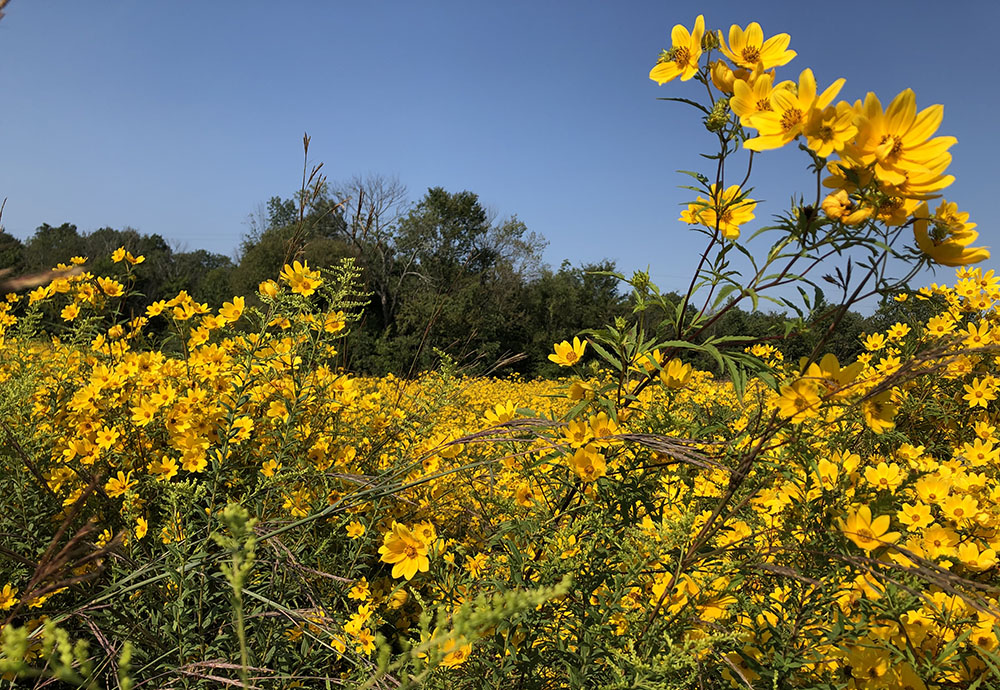
Beggarticks flowers (Bidens frondosa) at Loretto Motherhouse Farm in Kentucky (Susan Classen)
The region in central Kentucky where the Sisters of Loretto have resided for 200 years is often described as "holy land." Now, more than 650 acres of that land surrounding their motherhouse will be protected and preserved permanently under the terms of a new conservation easement.
The arrangement, signed Jan. 18 with the Bluegrass Land Conservancy, will place more than 80% of the congregation's nearly 800 acres of land in Nerinx, Kentucky, under an easement, a legally binding and voluntary agreement that restricts development for conservation purposes and mandates current and future owners to abide by the outlined terms. The protected lands include 110 acres of cropland, 242 acres of pasture and hayfields, and 265 acres of woodlands.
Approximately 654 acres in all, the newly preserved area of farm fields, forest, native grasses, lakes and creeks is more than six times larger than the Vatican City State.
"The Loretto Community has long been committed to caring for Earth," Sr. Barbara Nicholas, Loretto president, said in a statement.
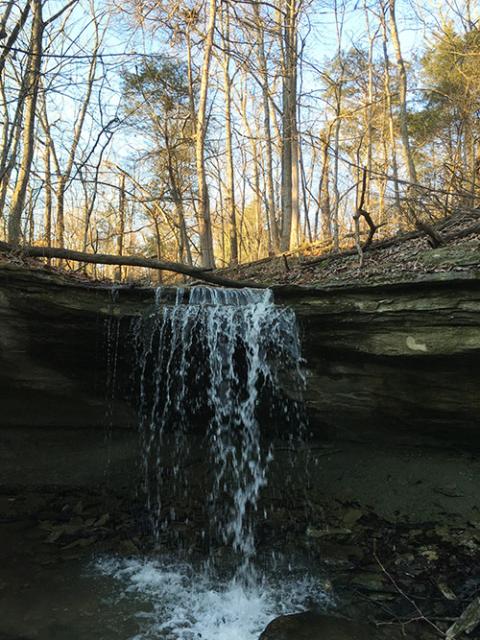
Waterfall at Loretto Motherhouse Farm (Susan Classen)
The decision, decades in the making, is part of the Loretto Sisters' participation in the Laudato Si' Action Platform, a Vatican initiative that lays out steps for individual Catholics and institutions to implement the sustainable lifestyles and integral ecology articulated in Pope Francis' 2015 encyclical, "Laudato Si', on Care for Our Common Home."
At a signing ceremony Jan. 18, Nicholas noted that Laudato Si' reminds us that humans are a part of nature, not separate from it. "Our commitment to peace and justice, to learning and teaching, extends not only to Earth but is rooted in our understanding that we are of Earth."
She also connected the conservation effort to the congregation's constitution, which ends with the words, "Let Loretto be Loretto forever."
"It is our responsibility to protect our sacred Motherhouse lands; doing so ensures that these waters, forests and grasslands will be protected into perpetuity, providing cleaner water and air for all," Nicholas said.
Jessie Hancock, executive director of the Bluegrass Land Conservancy, called the 650 acres "a significant tract of land," and one of the larger conservation efforts among the 32,600 acres the conservancy has helped permanently protect.
The conservancy will act as steward of the easement and perform annual checks to ensure its terms are not violated. As part of the agreement, the Loretto Sisters paid a one-time fee of $10,000; in addition, they are responsible for managing the land, including any conservation efforts, under the terms laid out in the easement.
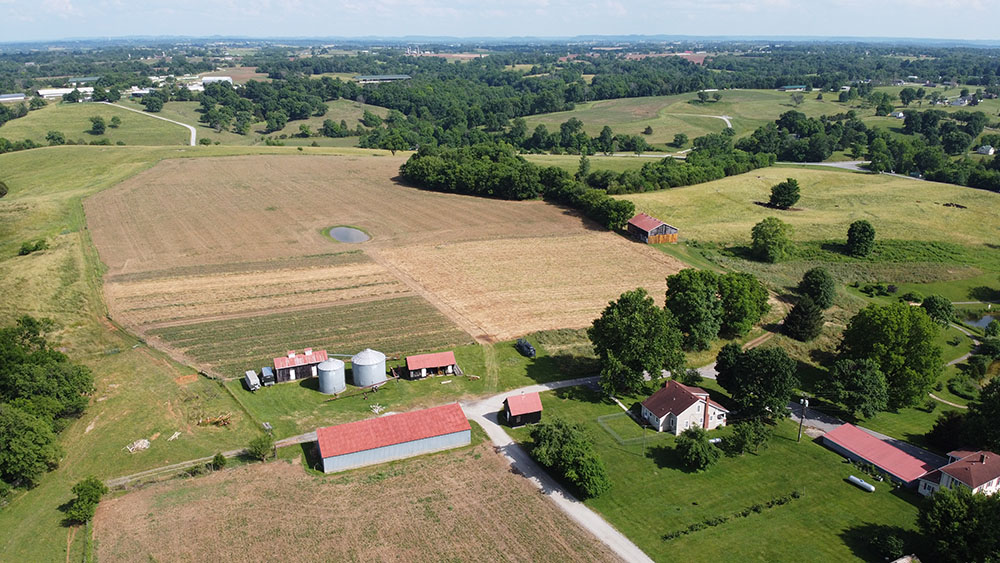
An aerial view of farmland on the Sisters of Loretto land in Kentucky (Loretto Community/Neil Tucker)
Hancock said that the Loretto Sisters' decision to preserve their land was "incredibly important."
"For the local community there, I think it's a wonderful example and opportunity," she told EarthBeat.
Since 1812, the Loretto Sisters have called this corner of Kentucky home, an area in Marion County often referred to as "the Holy Land" due to the many religious communities that settled there in the 18th and 19th centuries. Of the Loretto community's 267 members, about 60 sisters and seven co-members currently reside at the motherhouse.
The question of preserving land for the future has been considered more in recent years by numerous congregations of Catholic women and men religious. From New York to the Midwest, they have established easements of their own and other preservation methods to ensure their lands endure even past their own communities' time.
For the Lorettos, discussion of ways to preserve their land for future generations began decades ago in the early 1980s. At the time, land trusts were fairly new and few were thinking about conservation in that way, said Jessie Rathburn, a Loretto co-member and the community's Earth education and advocacy coordinator who worked on the conservation easement.
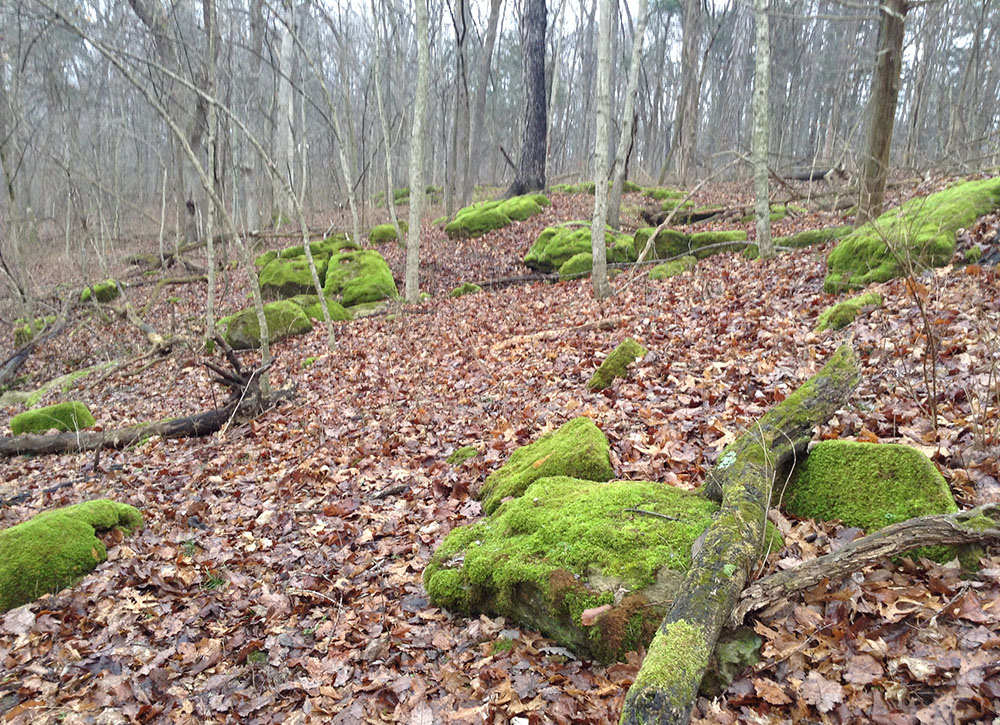
Wooded upland at Loretto Motherhouse Farm (Susan Classen)
Attention to the future of the sisters' land ramped up in 2013, after fossil fuel companies sought to build the Bluegrass Pipeline across their property, including possible use of eminent domain. The Loretto Sisters, alongside the Dominican Sisters of Peace in St. Catherine and Sisters of Charity at Nazareth, joined others in their community to resist the project, at times with musical protests, and in 2014 successfully blocked the pipeline, which sought to transport liquefied gasses extracted through hydraulic fracturing, or fracking, from Pennsylvania, Ohio and West Virginia through Kentucky and eventually to the Gulf Coast.
"It was at that point that people really started thinking again about what can we do to protect our lands," Rathburn told EarthBeat, with sisters also eager to protect a recently established nature preserve cemetery from development down the road.
Conversations about the six-acre cemetery led the sisters to consider a more encompassing preservation approach. A committee was appointed in 2018 to examine options for conservation, including selling off land to establish a state park.
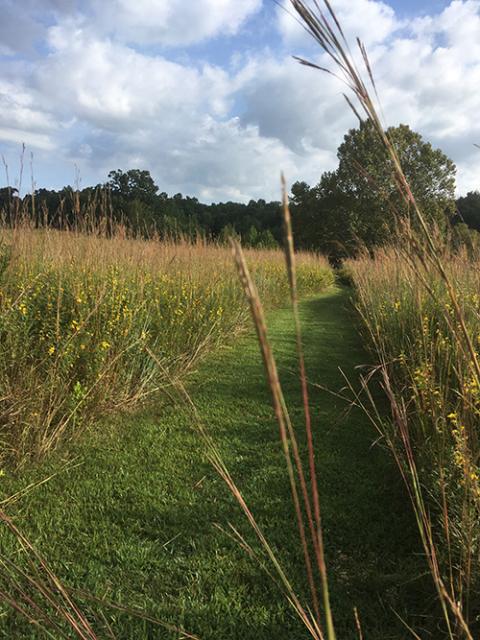
A path through a field at Loretto Motherhouse Farm (Susan Classen)
As the sisters surveyed the various land trusts in the region, they also learned more about the rapid loss of farmland like theirs in Kentucky and across the country. According to the American Farmland Trust, millions of acres of farmlands in the U.S. have been converted to other uses in the past two decades alone, and in Kentucky, more than 800,000 acres of farmland were converted for real estate development between 1992 and 2012.
A desire to keep their lands open to farming led the Lorettos to the Bluegrass Land Conservancy, which specializes in working with family farms.
"They wanted to make sure that the land could be used and they could keep providing services to the community and to the larger world at hand," Hancock said.
The Loretto community has farmed the land at its motherhouse since 1824. Today, a farm staff with two full-time farmers raises cattle and grows vegetables and seasonal crops like sweet corn, soybeans and pumpkins. They plan to add chickens this year. The food is used in the motherhouse kitchen and also sold in the local community.
The sisters remain "very involved," Rathburn said, in how the land is managed and are always eager to learn when a new calf is born.
The easement specifies that the farmland must remain available to agricultural use. In addition, the forest cannot be torn down for farming purposes, and the property must remain free of residential or commercial development that would interfere with its woodlands, watersheds and streams. Not only to protect those ecosystems and species that call it home, but also so that people can "see that open space and appreciate the beauty," Rathburn said.
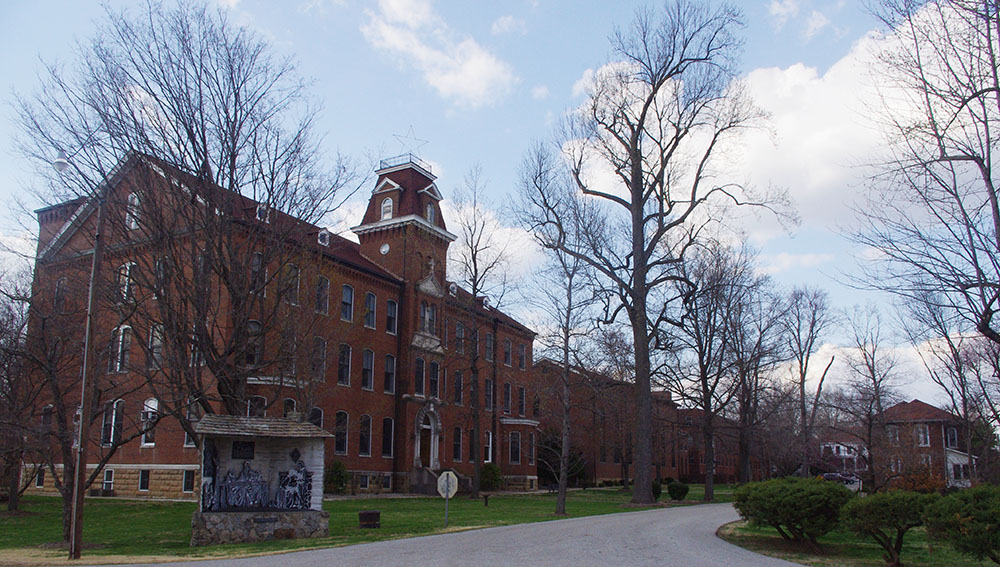
The Loretto Motherhouse in Nerinx, Kentucky (Wikimedia Commons/Nheyob)
Among the land left out of the easement is the 30-acre motherhouse campus that includes the church, convent and nursing home. Another 75 acres was designated for future needs — whether for the Lorettos or the land's next owners — for instance, housing for migrant farmworkers.
The conservation easement is the latest step by the Loretto Sisters to care for creation. They were among the first Catholic institutions to divest from fossil fuels, voting unanimously as a congregation in July 2015, a month after Laudato Si' was released. A land ethic statement guides their farming and conservation practices, prioritizing non-GMO seeds, renewable energy, open grazing for cattle and regenerative agricultural principles. A 2018 resolution to mitigate the congregation's contributions to climate change helped pave the way for the land conservation.
"This is one step that we have taken. There are many more steps that will come in our future," Rathburn said.
More farmers and landowners are considering easements as they age and consider what may come next for their land after they're gone, Hancock said. That also includes religious communities. The Bluegrass Land Conservancy has worked with other religious groups in recent years, including the establishment of an easement at St. Catherine's farm in December. Hancock hopes the example of the Lorettos will inspire more faith-based communities to consider similar options with their own land property.
Advertisement
Learning about land conservation has also led the Lorettos into conversation with local Native American tribes, including the Osage Nation, about their history and a possible ongoing relationship with the land where the motherhouse is located.
For Rathburn, seeing the easement signed held special significance.
Before beginning work with the Lorettos about a decade ago, she helped manage an urban farm in Denver that grew food for the neighborhood and local restaurants and markets, as well as some nearby public schools. But the farm was eventually overtaken by development with Denver's rapid growth, paved over to become a parking garage. "A true heartbreak," Rathburn recalled.
Days after the easement papers were signed, as she walked with her foster children through the woods at the motherhouse, she told them, "These woods are always going to be here. They're always going to be woods."
"It's an incredible event knowing not only that it's protected today, but ... that generations of people will be able to grow food here, that generations will learn about ecology and will feel this kinship with Earth."




